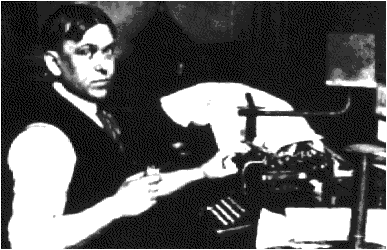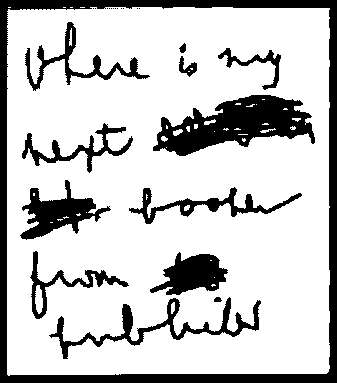The American
Iconoclast
Marion Elizabeth Rodgers
(Oxford University Press)

- Moody began, like the rest of them, by trying to paralyze his customers with fright, but an English evangelist, the Rev. Harry Moorehouse, showed him that it was a bad scheme, for when they ceased to shiver they tended to slip back into sin. Moreover, being harrowed was unpleasant, so the more timid who were precisely the more likely Bible fodder, remained away.
Mencken's style made full use of parallelism, a powerful vocabulary, blended with facts and carefully executed overstatement, mixed in a brew of contrariness to set the reader if not the world on edge:
- If George Washington were alive today, what a shining mark he would be for the whole camorra of uplifters, forward-lookers and professional patriots! ... He was not pious. He drank whisky whenever he felt chilly, and kept a jug of it handy. He knew far more profanity than Scripture, and used it and enjoyed it more ... He took no interest in the private morals of his neighbors. Inhabiting These States today, George would be ineligible to any office of honor or profit. The Senate would never dare confirm him; the President would not think of nominating him; the Methodists of his native State would be denouncing him (he had a still at Mount Vernon) as a debaucher of youth ... And what a chance there would be for that ambitious young district attorney who thought to shadow him on his peregrinations --- and grab him under the Mann Act!
The true stars in the life of Mencken were not the women (who, at best, he used rather than loved), but the men that spotted him early on, gave him a chance, and then once he began to rise in status, stood behind him, no matter how startling his words. These brave men should have been given their own chapters here, rather than a few passing references, including the man who first hired him as reporter, Max Ways, City Editor of the Baltimore Herald, Charles Gratsy, who gave him his first column at the Baltimore Sun, Alfred A. Knopf who published his books, and most of all, Paul Patterson, President of the Baltimore Sun, who stood behind him --- despite thousands of vituperative letters, canceled subscriptions, especially during Mencken's unpopular defense of the Germans during WWI, and opinionated reporting on the Scopes Trial.
- The Great Baltimore Fire of 1904 was Mencken's first opportunity, at age twenty-four, to show his stuff: "The scene was particularly picturesque ... It was a swell day for journalists ... It made a grand show, full of catnip for a young city editor."
- On being invited to speak at a forum, he wrote: "It would take five kegs of beer to neutralize my stage fright ... Once they see me they will set the wolf-hounds on me."
- He once wrote, "I have long advocated the segregation of all babies upon remote and well-guarded farms from birth until the age of 3 years."
- He called his own written early verse "Kipling fermented, ratted, and radiating ammonia."
- He referred to the citizens who lived in other parts of Maryland, rather than his beloved Baltimore, as "barbarians in an Alsatia ... morons with ignorant and ignoble minds."
- In 1948, when Mencken was chastised for describing the Afro-American Charles P. Howard (speaker at the Progressive convention of that year) as "a tall, full-bodied barrister of the color of a good ten-cent cigar," he was denounced as "Hitlerite" and a "racist." Grumbled Mencken, "Nobody denounced me as a white-baiter when I wrote that Herbert Hoover had a complexion like unrisen dough."
As he aged, suffering from shortness of breath and occasional loss of memory, he told his brother that he could "smell the angels." His last days were a horror. He suffered an embolism in 1948 and a heart attack shortly after. A man who ate and breathed words was forced, for almost ten years, to forgo reading and writing.
 The saddest illustration of them all (of the many fascinating ones that appear here) is a note scrawled in a barely legible hand, asking "Where is my next booke from publisher" Mencken's third-floor study at 1542 Hollins Street was filled with magazines and letters and his own books and thousands of others. This is the man who helped form America's literary power, probably more than anyone after Twain and James. Yet after the strokes he could no longer make any sense of what he called the "scrawls." He would try to read, fail, and for the next days spend his time in solitary despair.
The saddest illustration of them all (of the many fascinating ones that appear here) is a note scrawled in a barely legible hand, asking "Where is my next booke from publisher" Mencken's third-floor study at 1542 Hollins Street was filled with magazines and letters and his own books and thousands of others. This is the man who helped form America's literary power, probably more than anyone after Twain and James. Yet after the strokes he could no longer make any sense of what he called the "scrawls." He would try to read, fail, and for the next days spend his time in solitary despair.In 1956, when he died, his friend James Cain wrote of the recurrence of "the censor, the bigot, and the patrioteer in full cry once more."
- One wonders who the big bull elephant will be, to smash at them hard again, and whether there ever will be another one quite as big, quite as brave, quite as mad as Mencken.
Part I
of this review
Go to
a reading
of H. L. Mencken
Go to
another reading
of H. L. Mencken